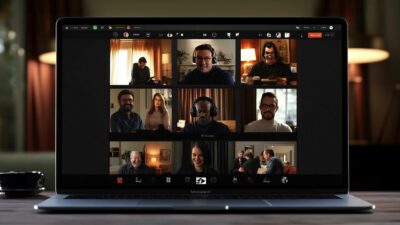
Relax, computer users, after only two weeks Microsoft will stop teasing you as the company begins the next phase of an ambitious — and risky — $300 million campaign intended to make over its tarnished image.
The campaign, which begins Thursday and carries the theme “Windows. Life without walls,” will move away from the enigmatic teaser commercials that featured Bill Gates and Jerry Seinfeld in offbeat conversations about shopping, shoes, suburbia and the potential of computing to improve life. The teaser ads have generated considerable discussion since they started on Sept. 4, not all of it positive.
What follows is an audacious embrace of the disdainful label that Apple, Microsoft’s rival, has gleefully — and successfully — affixed onto users of Microsoft products: “I’m a PC.”
 One new Microsoft commercial even begins with a company engineer who resembles John Hodgman, the comedian portraying the loser PC character in the Apple campaign. “Hello, I’m a PC,” the engineer says, echoing Mr. Hodgman’s recurring line, “and I’ve been made into a stereotype.”
One new Microsoft commercial even begins with a company engineer who resembles John Hodgman, the comedian portraying the loser PC character in the Apple campaign. “Hello, I’m a PC,” the engineer says, echoing Mr. Hodgman’s recurring line, “and I’ve been made into a stereotype.”
The strategy to use the Apple attack as the basis for a counterstrike is typical for the agency behind the campaign, Crispin Porter & Bogusky.
Crispin Porter, part of MDC Partners, relishes efforts to transform perceived negatives into positives. For another client, Burger King, the calorie-stuffed menu is portrayed to a target audience of young men as a rebellious personal choice to “Have it your way.”
Mr. Gates makes a cameo appearance in the new Microsoft spots, along with celebrities like the actress Eva Longoria, the author Deepak Chopra and the singer Pharrell Williams. (Mr. Seinfeld is gone, at least for now.)
But the stars are everyday PC users, from scientists and fashion designers to shark hunters and teachers, all of whom affirm, in fast-paced, upbeat vignettes, their pride in using the computers that run on Microsoft operating systems and software.
Among them are more than 60 Microsoft employees, who are accompanied in the ads by e-mail addresses — even Mr. Gates’s (bi**@wi*****.com).
Apple executives have been “using a lot of their money to de-position our brand and tell people what we stand for,” said David Webster, general manager for brand marketing at Microsoft in Redmond, Wash.
“They’ve made a caricature out of the PC,” he added, which was unacceptable because “you always want to own your own story.”
The campaign illustrates “a strong desire” among Microsoft managers “to take back that narrative,” Mr. Webster said, and “have a conversation about the real PC.”
A giant advertiser responding to the disparagement of a smaller rival can be fraught with peril. Consumers may see it as a validation of the claims, or even bullying. On the other hand, ignoring the taunts can damage images and sales.
In the car-rental wars, the market leader, Hertz, long kept silent about a cheeky Avis campaign that proclaimed: “We’re No. 2. We try harder.” But after Avis revenue grew robustly, Hertz shot back: “For years, Avis has been telling you Hertz is No. 1. Now we’re going to tell you why.”
Similarly, Coca-Cola said nothing as Pepsi-Cola challenged its hegemony in the cola category — until it turned tradition upside-down in 1985 by bringing out New Coke, with a more Pepsi-like taste. Roger A. Enrico, who was in charge of the PepsiCo beverage business, celebrated by co-writing a book titled “The Other Guy Blinked: How Pepsi Won the Cola Wars.”
Keep reading via NYTimes

Frank Wilson is a retired teacher with over 30 years of combined experience in the education, small business technology, and real estate business. He now blogs as a hobby and spends most days tinkering with old computers. Wilson is passionate about tech, enjoys fishing, and loves drinking beer.











Leave a Reply
You must be logged in to post a comment.